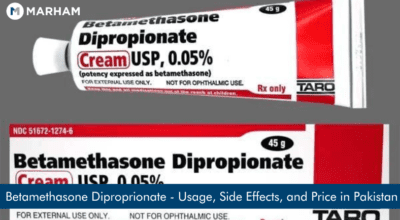Betamethasone Dipropionate is a topical cream available in the market for treating skin diseases like eczema, fungal infections, and bacterial diseases. These diseases produce redness, itching, swelling, or other discomforts and then they are easily relieved by applying this topical cream, gel, lotion, or ointment. Also, betamethasone dipropionate is used to treat adults suffering from mild to moderate plaque psoriasis.
Let us discuss betamethasone dipropionate applications, negative effects, and price in Pakistan in this article.
About Betamethasone Dipropionate
Glucocorticoid steroid betamethasone dipropionate possesses anti-inflammatory and immunosuppressive properties. To treat itching and other minor skin disorders like eczema, it is used topically as a cream, ointment, lotion, or gel (Diprolene).
Dry skin and a light stinging sensation after application are minor side effects. Inflammatory skin disorders like dermatitis, eczema, and psoriasis are effectively treated with betamethasone dipropionate, a corticosteroid of “ultra-high efficacy.”
Brand Names
Betamethasone dipropionate is sold under the brand names;
- Alphatrex
- Beta-Val
- Diprolene
- Diprolene AF
- Diprosone
- Dovobet (LEO Pharma A/S)
- Eleuphrat
- Luxiq
What is the Price of Betamethasone Dipropionate in Pakistan?
In Pakistan, betamethasone dipropionate costs between 80-100 rupees in 2022. It is available both online and at pharmacies. You can use the Marham app to purchase betamethasone dipropionate online.
Uses of Betamethasone Dipropionate
According to the studies, the uses of betamethasone dipropionate are;
- Relieve redness
- Lessen itching
- Treat adults with mild to moderate plaque psoriasis
- Reduce swelling
- Treat other discomforts caused by certain skin conditions
Side Effects of Betamethasone Dipropionate
Common side effects according to experts of betamethasone dipropionate include:
- Skin redness
- Dryness
- Stinging
- Burning
- Inflammation
- Irritation
- Acne
- Unwelcome hair development
- Skin tone varies
- Glossy skin or bruises
- A rash or little red pimples around the mouth
- Tiny skin lumps that are either white or red
Who Should Not Use Betamethasone Dipropionate?
Children under the age of 12 should not use the majority of betamethasone preparations, and patients under 18 years of age should not use betamethasone spray. Because it could catch fire, betamethasone foam shouldn’t be used next to an open flame or a source of extreme heat.
Other Details About Betamethasone Dipropionate
The following list of vital information about betamethasone dipropionate includes:
Storage
The following are the details regarding betamethasone dipropionate’s storage;
- The medication should be kept at room temperature in a closed container away from heat, moisture, and bright light.
- Keep out of children’s reach.
- Do not store expired or unnecessary medications.
- To carefully dispose of the waste after using these ointments, you can ask about the procedure from your doctor.
- Do not keep used betamethasone topical spray for more than 4 weeks.
Dosage
For topical medications (cream, gel, lotion, and ointment)
- Apply to the affected region of the skin once or twice daily for adults and children 13 years of age and older.
- The use of this ointment is not advised for children under the age of 13.
For topical spray dose forms
- Adults: Apply twice daily to the skin’s afflicted area. Use of this medication should not exceed 4 weeks.
- Use is not advised for kids.
Proper Use of Betamethasone Dipropionate
- Before and after using this medication, wash your hands with soap and water.
- On the affected area of your skin, gently apply this ointment with a thin layer.
- Do not pour water on your affected area of skin until the medication has dried.
- Shake the spray thoroughly before each use.
- If not instructed to do so by your doctor, avoid bandaging the skin being treated.
- Make sure you understand how to use any occlusive dressings or airtight covers that your doctor may have instructed you to use over the medication.
- Use of occlusive dressings should only be done as instructed because they enhance the quantity of medication that is absorbed through your skin.
Drug Interactions of Betamethasone Dipropionate
The drug interactions of betamethasone dipropionate include:
- Aminoglutethimide
- Antibiotics, specific macrolide
- Amphotericin B injection and potassium-depleting agents
- Oral anticoagulants
- Anticholinesterases
- Antidiabetics
- Cholestyramine
- Antitubercular drugs
Substitutes of Betamethasone Dipropionate
Here is the drug list that can be used in place of betamethasone dipropionate.
- Terbinafine
- Lotrisone
- Fluconazole
- Miconazole topical
- Lamisil
- Ketoconazole
Consult a Dermatologist To Discuss Skin Problems
You can use betamethasone dipropionate to treat any skin allergy but we would suggest you always take a medicine after discussing it with some experts. Therefore talking about your skin problems with a dermatologist would really help you. Click here to book a meeting with a skin specialist.
FAQs
1. Is betamethasone a potent steroid?
The majority of betamethasone skin creams are effective. Based on the strength required for effective treatment, your doctor will decide which steroid skin therapy is best for you. Most skin disorders can be treated with mild to moderately strong medication.
2. Where should you not apply betamethasone?
Avoid using this cream in the genital, rectal areas, and armpits. If you are using betamethasone on a child’s diaper area, do not use tight-fitting diapers or plastic pants. It can cause serious side effects.
3. How many times a day can you use betamethasone?
For skin edema, itching, and redness: Apply to the affected region of the skin 1 or 2 times per day for adults and children 13 years of age and older. The use of this medicine is not advised for children under the age of 13.
Disclaimer: The content published on Marham.pk is for informational or educational purposes only, produced from FDA-approved literature, and does not substitute professional medical advice. Please consult your healthcare provider before using a prescription or over-the-counter drug, or any other treatment option.

